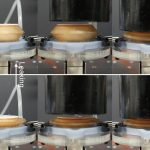Scientists develop more reliable semiconductor layering for electronic devices
3D integrated circuits are a key part of improving the efficiency of electronics to meet the considerable demands of consumers.
They are constantly being developed,...
Scientists are innovating computer vision one pixel at a time
Scientists have recently completed Phases 1 and 2 of a DARPA project looking to make advances in computer vision.
Fitness app loophole allows access to home addresses
Despite attempts to anonymize user data, the fitness app Strava allows anyone to find personal information—including home addresses—about some users.
ChatGPT helps design a tomato-harvesting robot
Using ChatGPT, an advanced language model, the researchers successfully collaborated with AI to design a tomato-harvesting robot.
ChatGPT vs Human: How to spot AI-generated science writing
A remarkable tool can distinguish between human-written and AI-generated academic science writing with over 99% accuracy.
Calculators vs. Artificial Intelligence: Are AI really taking over?”
Have you ever wondered why we're okay with using calculators, but get nervous when we talk about Artificial Intelligence (AI)?
Improving AI vision: From self-driving cars to digital avatars
Have you ever wondered how self-driving cars see the world or how a virtual character in a video game recognizes objects?
Sponges teach robots how to handle fragile objects
Scientists at the University of Bristol have discovered an impressive way to make robotic arms gentler – all thanks to the humble sponge!
Heat highways could keep your electronics cool
Have you ever noticed how your phone or laptop gets hot when you're using it for a long time, or when you're playing a high-graphic game?
New machine learning framework could protect consumers’ mobile location data
Researchers developed a machine learning framework to quantify privacy risks, preserve data utility, and protect consumers.







